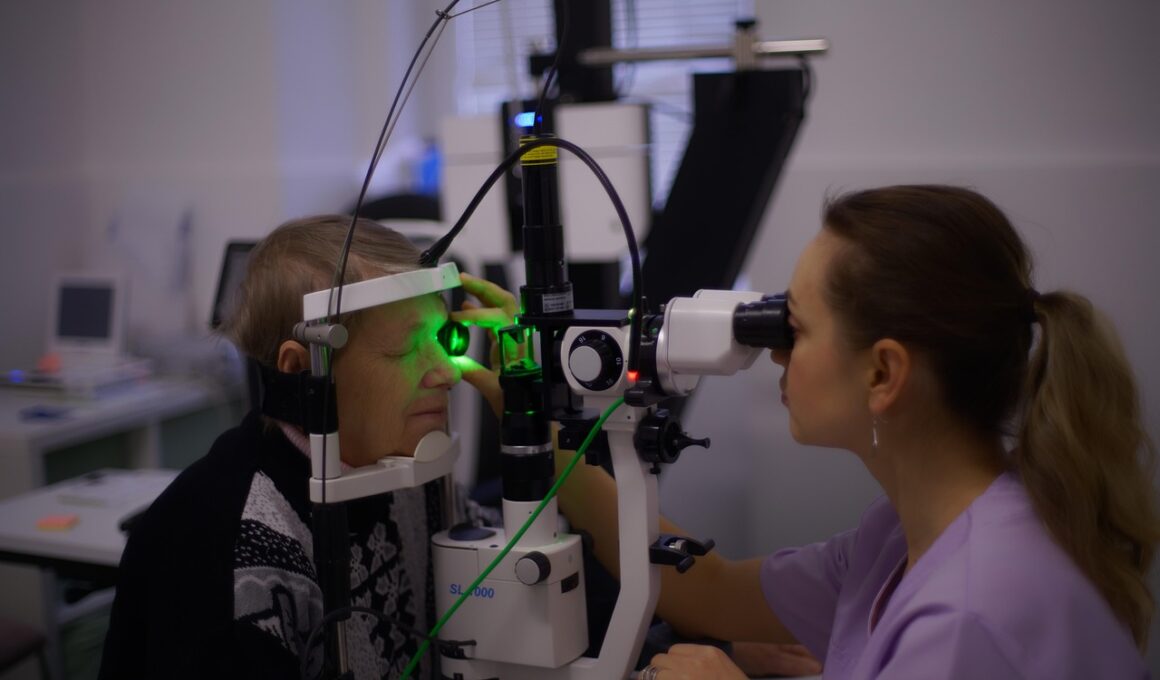The Impact of Antioxidants on Eye Aging
Antioxidants play a crucial role in maintaining eye health and combating the natural aging process. The eyes, being one of the most vulnerable organs, require adequate protection from oxidative stress. This stress occurs when free radicals, resulting from environmental factors such as UV rays and pollution, outnumber the body’s antioxidants. Important antioxidants for eye health include vitamins C and E, lutein, and zeaxanthin. These nutrients help neutralize free radicals, potentially slowing down or preventing age-related eye diseases. Studies have shown that individuals consuming antioxidant-rich diets exhibit lower incidences of conditions such as macular degeneration and cataracts. Furthermore, incorporating foods high in these antioxidants can be significantly beneficial. Leafy greens, nuts, citrus fruits, and colorful vegetables are excellent sources of these protective nutrients. Regularly consuming these foods can contribute to long-term eye health, helping to maintain clear vision as one ages. Eye supplements are also available, which offer concentrated doses of these essential antioxidants. However, it’s advisable to consult healthcare professionals before starting any supplementation to ensure the correct dosage and combination for specific needs.
Aging is an unavoidable and natural process, affecting every system in the human body, including our eyes. As we age, the risk of developing vision problems increases significantly. Antioxidants are essential in this context as they help to mitigate the effects of cellular damage within the eyes. One prominent condition associated with aging is age-related macular degeneration (AMD), which affects the macula and can lead to vision loss. Nutrients such as lutein and zeaxanthin, present in high concentrations in the retina, play a vital role in filtering harmful blue light and protecting the eye from oxidative damage. By reducing light-induced oxidative stress, these antioxidants can help maintain retinal health and function. Furthermore, vitamin C, an essential antioxidant, aids in collagen production, which is important for maintaining the structural integrity of the eye. This can assist in preventing cataracts, another age-related issue. Overall, incorporating more antioxidant-rich foods into one’s diet may not only enhance visual health but also improve overall well-being as we age. Hence, targeted nutritional strategies can significantly impact eye aging and the diseases associated with it.
Despite the benefits of natural food sources, the use of supplements has become increasingly popular. Many individuals find it challenging to consume adequate amounts of antioxidants through diet alone, leading them to seek supplemental alternatives. Antioxidant supplements may contain a variety of nutrients known for their eye benefits. Common ingredients include beta-carotene, zinc, lutein, zeaxanthin, and vitamins C and E. Research suggests that these supplements could play a key role in reducing the progression of eye diseases like AMD. One significant study indicated that a specific combination of these antioxidants significantly lowered the risk of developing advanced AMD in at-risk populations. However, it’s important to remember that supplements should complement, not replace, a balanced diet. Consulting with a healthcare provider before starting such a regimen is always wise, as excessive consumption can lead to adverse effects. Moreover, individuals should focus on maintaining a diet rich in fruits and vegetables, as they are not only sources of antioxidants but also provide other essential vitamins and minerals needed for overall health. This holistic approach can contribute to better eye health and quality of life.
Natural Diet vs. Supplements
When considering the best approach to utilize antioxidants for eye health, one must weigh the benefits of natural dietary sources against those of supplements. A varied diet rich in colourful fruits and vegetables offers numerous nutrients in a balanced way that contributes to overall eye health. Whole foods provide additional health benefits, such as fiber, which supplements typically lack. Moreover, the synergistic effect of consuming multiple antioxidants through whole foods can enhance their absorption and efficacy. Foods like spinach, kale, carrots, and berries are exceptional choices for anyone looking to support eye health naturally. Alternatively, many find that incorporating high-quality supplements can be an effective solution, especially for those who have specific deficiencies or find it difficult to attain adequate nutrient levels through diet alone. Ultimately, individual needs and lifestyle choices will dictate the best path. A tailored approach that embraces both natural foods and supplements may offer the most effective means of promoting eye health and combating age-related decline. By balancing these two elements, individuals can ensure they receive the full spectrum of benefits necessary for optimal eye aging management.
Research continues to shed light on the importance of antioxidants in promoting eye health. More studies are being conducted to clarify the specific roles that each antioxidant plays in eye protection. For instance, some research indicates that omega-3 fatty acids may also have a positive effect on eye health. Alongside traditional antioxidants, omega-3s contribute to the structural integrity of retinal cells while also providing anti-inflammatory benefits. This wide range of beneficial substances means there’s no one-size-fits-all solution when it comes to nutrition for visual well-being. Instead, diversity in one’s diet is key to maximizing nutrient intake. Nutritional recommendations may also vary according to individual health needs, environment, and lifestyle factors. Therefore, working closely with healthcare professionals can help individuals tailor their nutritional plans effectively. Tracking dietary habits and noting changes in eye health could also yield valuable insights over time, guiding more personalized strategies. As the evidence supporting the connection between diet and eye aging evolves, it highlights the significance of making informed choices concerning one’s nutrition to ultimately preserve eyesight as long as possible.
In conclusion, antioxidants are essential for preventing and managing eye aging, playing a key role in promoting overall ocular health. With the increasing prevalence of age-related eye diseases in our aging population, it is more critical than ever to prioritize eye care through diet and supplements. A proactive approach, which includes consuming sufficient levels of antioxidants, can effectively mitigate oxidative stress and help maintain clear vision throughout aging. While many factors impact eye health, incorporating a diverse range of nutrient-rich foods and well-chosen supplements can make a significant difference. Every individual should assess their unique needs and circumstances concerning eye care and aging. Regular eye examinations, alongside dietary adjustments and possibly supplements, can substantially help in preserving vision well into old age. As research continues to support the crucial link between nutrition and eye health, individuals have the power to take charge of their eye health proactively. Awareness, education, and assessment remain vital tools in the journey towards healthier vision in the face of aging. By prioritizing antioxidant intake, quality of life can be improved as one ages, made easier and brighter by better eye health.
Final Thoughts on Eye Health
Regular exercise and hydration, coupled with a nutrient-rich diet, can also synergize well with antioxidant consumption. Staying physically active promotes circulation and overall well-being, which, in turn, benefits eye health. Adequate hydration ensures that tears are produced effectively, which is essential in maintaining the health of the eyes. Both factors contribute to reducing the risk of dry eyes and fatigue, common complaints in our digital world today. It is essential to consider these lifestyle components alongside nutritional habits when assessing how to best support eye aging and health. Stress management techniques, such as mindfulness and adequate sleep, further play a role in preserving vision as they help mitigate factors that can lead to eye strain. In today’s world of screens and artificial lighting, these supportive practices have never been so crucial. By adopting a holistic approach encompassing diet, lifestyle, and stress management strategies, individuals can significantly contribute to their visual health. As the understanding of how antioxidants and overall health connect evolves, committing to a healthier lifestyle becomes an even more impactful decision for maintaining quality vision long-term.


